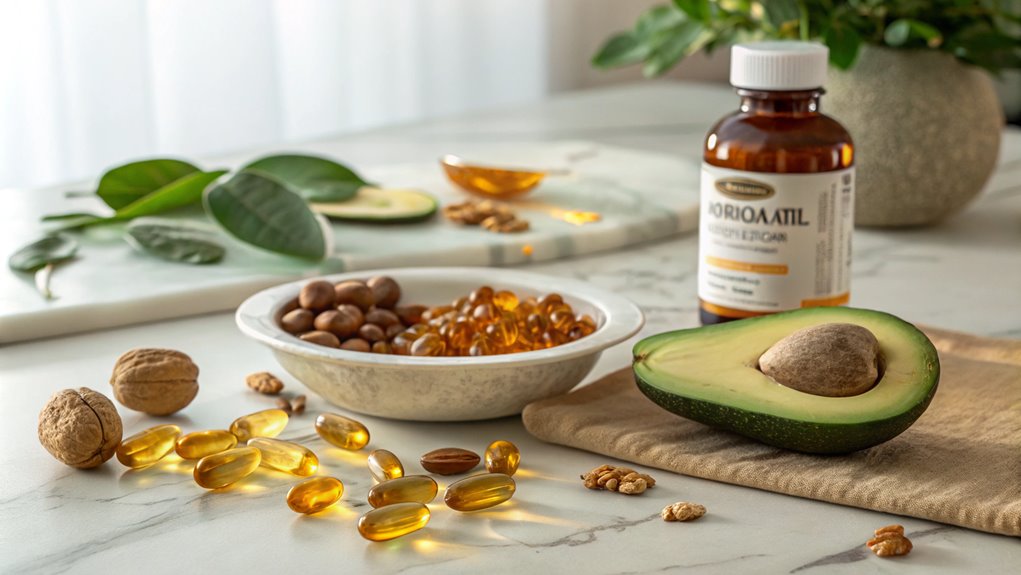Supplements for Memory Loss During Menopause

Several evidence-based supplements can help manage menopause-related memory loss and cognitive decline.
You’ll find significant benefits from ginkgo biloba (120mg daily) for attention and visual memory, while soya isoflavones (100mg daily) enhance verbal memory and planning abilities.
Consider adding resveratrol (150-200mg daily) for working memory support, along with essential nutrients like vitamin D (2,000 IU daily) and omega-3 fatty acids.
L-theanine (100-200mg daily) promotes mental alertness, and B-complex vitamins facilitate neurotransmitter function.
When combined with proper timing and lifestyle modifications, these supplements create a comprehensive approach to addressing menopausal cognitive symptoms.
Further exploration of specific dosing strategies and combinations will optimize your results.
Table of Contents
Understanding Menopause Brain Fog

Many women experience cognitive difficulties during menopause, with up to 60% reporting symptoms collectively known as “brain fog.”
This neurological phenomenon typically peaks during perimenopause and manifests as difficulties with memory, concentration, and mental clarity.
When you’re going through menopause, hormone fluctuations significantly impact your brain’s function.
Estrogen, which plays a crucial role in cognitive processes, begins to decline, affecting neurotransmitter activity and neural connections.
These changes can impair your working memory, verbal recall, and processing speed.
The cognitive changes you’ll notice might include forgetting familiar words, losing track of conversations, or having trouble multitasking.
Discover Your Path to a Longer, Healthier Life!
Take our free quiz to see how your lifestyle measures up to the world's longest-living communities and receive expert tips for a healthier, longer life.
Take the QuizYou may find it harder to focus on complex tasks or notice delays in your decision-making abilities.
These symptoms often coincide with other menopausal symptoms like sleep disruptions and mood changes, which can further impact your cognitive performance.
Understanding that these symptoms are a normal part of the menopausal transition is essential.
Your brain is adapting to new hormonal levels, and while these changes can be frustrating, they’re typically temporary.
Most women experience improvement in cognitive function once their hormones stabilize post-menopause.
Natural Brain-Boosting Supplements

Scientific research has identified several natural supplements that can effectively target menopause-related cognitive decline.
Natural nootropics like Ginkgo biloba have demonstrated significant improvements in visual memory and attention at 120mg daily doses, while herbal adaptogens support your brain’s resilience to stress during hormonal fluctuations.
| Supplement | Daily Dosage | Primary Benefits | Time to Results |
|---|---|---|---|
| Ginkgo Biloba | 120mg | Visual memory, attention | 1-2 weeks |
| Soya Isoflavones | 100mg | Verbal memory, planning | 4-6 weeks |
| Resveratrol | 150-200mg | Working memory | 14 weeks |
| L-theanine | 100-200mg | Mental alertness | 2-4 weeks |
You’ll find that combining these supplements with omega-3 fatty acids (EPA/DHA) can enhance their effectiveness.
The recommended approach is to start with one supplement and gradually add others while monitoring your response.
Key nutrients like vitamin D (2,000 IU daily) and magnesium work synergistically with these brain-boosting compounds to support cognitive function.
For optimal results, you’ll want to maintain consistent supplementation for at least 8-12 weeks while tracking improvements in memory and focus.
Essential Nutrients For Memory

Core nutrients serve as fundamental building blocks for optimal cognitive function during menopause, with specific vitamins and minerals playing crucial roles in memory preservation.
You’ll find that vitamin D supplementation at 2,000 IU daily can significantly enhance your learning and memory capabilities during this transitional period.
B complex vitamin benefits extend beyond basic brain function, as these nutrients actively support neurotransmitter formation and facilitate communication between brain regions.
You’ll need adequate B6 levels specifically to maintain cognitive clarity and mental processing speed.
Omega 3 fatty acid impacts are particularly noteworthy, as EPA and DHA compounds directly support memory retention and attention span.
You should prioritize these essential fats to combat menopause-related brain fog and maintain cognitive flexibility.
Magnesium’s influence on your cognitive function becomes especially important during menopause, as higher levels correlate with improved performance on memory and attention tasks.
You’ll want to maintain optimal magnesium levels through supplementation to support your brain’s information processing capabilities and help mitigate stress-related cognitive decline during this period.
Lifestyle And Supplementation Strategy

Managing menopause-related cognitive symptoms effectively requires a comprehensive plan that integrates targeted supplementation with lifestyle modifications. A systematic protocol combining proven supplements and consistent practices can optimize results. Here’s how to approach it:
- Structured Supplementation Schedule: Take key nutrients such as ginkgo biloba (120mg) and resveratrol (150-200mg) at consistent times that fit your daily routine.
- Stress Management: Practice mindfulness techniques to lower cortisol levels, which can exacerbate cognitive symptoms during menopause.
- Dietary Adjustments: Incorporate principles from the Mediterranean or MIND diets to enhance the effects of your supplements and provide brain-supportive nutrition.
- Regular Exercise: Follow a consistent workout routine with strength training at least three times a week to boost cognitive function.
- Sleep Optimization: Establish a routine aiming for 7-9 hours of sleep nightly to aid brain recovery and improve supplement absorption.
- Tracking and Adjustments: Monitor your cognitive responses, adjusting supplement dosages and timing as needed based on your results.
Consult with your healthcare provider before modifying your supplement regimen, particularly if you’re on other medications, to ensure safety and effectiveness.
Timing Your Supplement Routine
Proper timing of supplement intake can significantly enhance their absorption and effectiveness for managing menopause-related cognitive symptoms.
You’ll want to take fat-soluble supplements like vitamin D and omega-3s with your largest meal of the day to maximize absorption.
For optimal timing, consume resveratrol with breakfast, as studies indicate better bioavailability during morning hours.
Space out your magnesium and calcium supplements, as they compete for absorption.
You’ll get better results by taking magnesium in the evening, which can also support sleep quality, while calcium is best absorbed in smaller doses throughout the day.
Lifespan Comparison Tool
Compare the life expectancy by the U.S. State
Consider taking ginkgo biloba in split doses, with 60mg in the morning and 60mg in the afternoon for sustained cognitive support.
Monitor your personal responsiveness to timing adjustments.
Some women find that taking B-complex vitamins early in the day prevents sleep disruption, while others may need to adjust soya isoflavone timing based on their digestive patterns.
L-theanine can be particularly effective when taken 30-60 minutes before mentally demanding tasks, while curcumin’s absorption improves when combined with black pepper and taken with healthy fats.
Conclusion
Like Theseus following Ariadne’s thread through the labyrinth, you’re now equipped with evidence-based solutions for navigating menopause-related memory challenges.
Strategic supplementation with clinically-proven compounds such as Ginkgo biloba, omega-3s, and targeted micronutrients can significantly improve cognitive function during this transition.
By implementing a structured supplement regimen alongside lifestyle modifications, you’re taking control of your neurological health through this hormonal evolution.

 972-393-1699
972-393-1699






